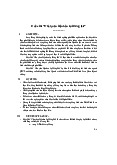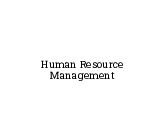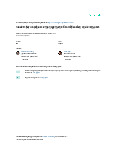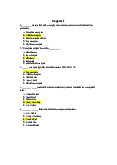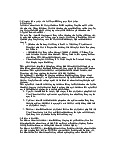







Preview text:
RESEARCH GRANT SCHEME FORM
(Please type the following particulars) Project Code:
RESEARCH PROJECT IDENTIFICATION Title of Proposed Research
FEASIBILITY STUDY OF WORK-BASED-LEARNING PROGRAMME IN HOTEL MANAGEMENT
EDUCATION: THE CASE OF PUBLIC-PRIVATE P ARTNERSHIP I N H O C HI MI NH C ITY V , IETNAM
Name of the Researcher(s) & Staff No. Designation Contract Expires Le Minh Thanh In: (if applicable) Staff no.: Principal Researcher Le Minh Thanh HP No Email Co-researcher(s) 1. Mai Kim Thoa HP No
Email thoa.maikim@hoasen.edu.vn +84 126 548 2131 2. HP No Email Faculty(s) Department(s) Research Categories:
□ Fundamental/ Pure Research □ Applied Research □ Up-scaling & Commercialisation
Proposed Budget VND20,000,000
Duration of Proposed Research 5 months Commencement Date 04/01/2016
Expected Date of Completion 04/06/2016 Signature of the
Principal Researcher: ______________________ Date: ______________________
SUMMARY OF PROPOSED RESEARCH PROJECT
Provide a summary of the proposed research project in not more than 200 words.
“Developing professional human resources staff for the tourism industry is an important step for
Vietnam as a member of the ASEAN Economic Community, officials of the Vietnam National
Administration of Tourism (VNAT) said at a press conference”, quoted from Vietnam News
(Tuesday, 1/12/2015, p.2). The article headlined “Improving tourism services a top priority” which
shows that Vietnam is preparing to improve its human resource in order to be ready for Mutual
Recognition Agreement on Tourism Professionals (MRA-TP) in ASEAN whereas allowing the free
flow of labourers in the hospitality industry; Vietnam can recruit skilled tourism workers from
ASEAN countries and vice versa. Therefore, in order to take advantage of MRA-TP, the country
needs to enhance competitiveness of tourism companies and training establishments, and focus on
policies to keep talented workers (Vietnam News, National, 1/12/2015, p.2).
However, Vietnam is facing the difficulty in developing human resource in hospitality industry. The
dilemma is that whereas hundreds of thousands of graduates fail to find jobs and yet businesses say
they face a shortage of skilled employees (Vietnam News, Employment, 6/11/2015, p.5). The
development of educational institution does not seem to match with the evolution of the labour
market. It is proposed that higher education should be reformed in order to make sure graduates are
qualified to get jobs without needing to be retrained.
This research aims to explore these issues and investigate the reasons behind such a scenario. It aims
to explore the potentials of work-based-learning and public-private partnership as a sustainable
strategy for development human capital for hospitality industry in Ho Chi Minh city, Vietnam. It
seeks to understand the factors that drives WBL programme worked in hospitality education; and
what determines and motivates the PPP to successfully implemented in order to attract, recruit,
develop and grow/enable of competent human resource in hospitality industry. The scope of the
research includes examining the practices and management of human resource, staff competency and
knowledge as well as sustainable human resource development and planning. It also aims to
understand and establish a pattern in the level of motivation compared to expectation in attracting
and retaining competent employees. Keywords 1. Human resource management 2. Hospitality industry 3. Work-based learning 4. Sustainable development 5. Public-private partnership
STATEMENT OF THE PROBLEM AND RESEARCH OBJECTIVES
In clear and concise terms, please state the study problem and the research objectives of the
proposed project. Research questions or hypotheses should also be listed. Use additional sheets if necessary.
The proposal aims to explore the feasibility of work-based-learning (WBL) programme in hotel
management education through public-private partnership (PPP). In particular, it seeks to
understand the factors that drives WBL programme worked in hospitality education; and what
determines and motivates the PPP to successfully implemented in order to attract, recruit, develop
and grow/enable of competent human resource in hospitality industry. The scope of the research
includes examining the practices and management of human resource, staff competency and
knowledge as well as sustainable human resource development and planning. It also aims to
understand and establish a pattern in the level of motivation compared to expectation in attracting
and retaining competent employees.
This research addresses the following key questions:
1) Will WBL programme be practicable in Vietnamese hospitality education?
2) What factors that drives WBL programme practicable in Vietnamese hospitality education?
3) What determines and motivates the PPP to successfully implemented in hospitality sector?
Specifically, the research objectives are:
1) To describe the underlying factors that drive people to work and stay in the hospitality industry.
2) To describe the underlying perception gaps between educators and commercial hotels in
terms of employment needs, knowledge and skills required in the job.
3) To describe the needs of WBL program in hotel management education in Vietnam.
4) To identify key factors that drive WBL programme practicable in Vietnamese hospitality education.
5) To explore the factors leading to long term sustainable hospitality human resource through PPP.
6) To propose a conceptual framework in how to develop WBL programme through PPP.
The research provides an understanding of the importance of creating a WBL programme that help
to sustain the hospitality human resource through public-private partnership. It tackles some light
on ways to improve and retain competent service staff and to reduce staff turnover via the proposed
framework. The output provides not only an insight into the development of competent service
staff; it has important academic and practical implications in relation to sustainable human resource
in hospitality industry. The research offers a useful conceptual framework (Figure 1) that takes
into consideration the key factors and strategic approach in developing WBL programme through
successful public-private partnership.
Figure 1 Research Conceptual Framework RESEARCH METHODOLOGY
Describe in detail the procedures and methods to be used to achieve the research objectives of the
proposed project. Each objective must be dealt with while discussing methodology. Type of
instruments to be used for data collection and analysis should be discussed. Use additional sheets if necessary.
The research is a pioneering qualitative investigation on the practices of WBL programme in hotel
management education as well as the feasibility of implementing the PPP. It raises several key
fundamental issues with regards to “why” and “how” in the practices of human resource and to
explore the subjective meanings of people’s actions. In this context, an interpretivism approach is
deemed relevant as it searches for the situational/contextual details and to understand the
background reality. An integrated qualitative methodological framework (in-depth interviewing and
focus groups) with educators, governors and hotel directors/ managers will be used for data
collection. Qualitative data methods are deemed relevant as little is known about the perception
towards work and working in tourism, as supported by Singleton et al (1988: 298-299), when “one
knows relatively little about the subject under investigation”, whereas the quantitative approach is
unable to provide an accurate and “consistent interpretation of people’s accounts” (Keliva and Chu, 2001: 253).
On site data collection will be done in Ho Chi Minh city, Vietnam, which is the biggest commercial
city, where hotel industry has been prominently developed apparelled with the hotel management
education sectors. It will offer a deeper understanding of the phenomena of the practice and
management of human resource in the hotel sector. A comparison work will be made between
industrial hoteliers and educators in order to identify the gaps in terms of employment needs,
knowledge and skills required in the job. Besides, this gives a more valid and holistic perspective of
data to identify and explain the feasibility of WBL programme through PPP. The sampling frame
consists of General Directors/ Managers of 5-star-rated hotels in the state, governors in Ministry/
Department of Tourism, and educators such as Principle/ Dean of Hotel Management School. Data
analysis seeks to “understand the people studied” and interprets meaning from the data (Patton,
1990: 392); thus the qualitative phenomenology approach is used as an analysis technique, which is
data and conceptually-driven. A single phrase or several significant statements, grounded in the
respondents’ own descriptions, enhance the reliability and validity of the findings. A multi data
source is carried out via interview data and focus groups data. EXPECTED RESULTS:
SIGNIFICANCE AND BENEFITS OF PROPOSED RESEARCH PROJECT
Discuss the expected results of the proposed research (e.g. publishable articles, chapter in books of
reading, etc.) and its significance for the discipline and the community. Use additional sheets if necessary.
The research provides an insight into the human resource issues and practices in hotel industry in
order to identify the needs of WBL programme which helps to sustain human resource development
through PPP. It offers explanation of why WBL programme and PPP can be a solution for
organizations and the industry retain talented human resource via the practice and management PPP in Ho Chi Minh city.
Furthermore, the research findings serve as important baseline data and as a conceptual framework
for the feasibility of WBL programme and PPP practicable in Vietnam. Human resource managers,
educators, and policy makers will have better understanding about WBL programme and PPP
through this research. Subsequently, the findings also aim to conclude if as WBL programme and
PPP are supported by all stakeholders.
Academically, the research has important implications for studies aimed to understand hospitality
human resource management in Vietnam, as a developing country. It opens to a new path of
implication for human resource management where PPP can be a sustainable strategy for human
capital. Two new discoveries of knowledge include: a) an insight into WBL and its implication in
closing gaps between educators and industry; and b) PPP serve as a sustainable tool for hotel industrial development. Research output Publications: 1) 2 journal articles 2) 1 seminar REFERENCES
List citations of literature referred to in the proposal text in standard format and in numerical order.
Kivela, J. and Chu, C.Y.H. (2001). Delivering Quality Service: Diagnosing Favorable and
Unfavorable Service Encounters in Restaurants. Journal of Hospitality and Tourism Research, 25(3), 251-271.
Patton, M. Q. (1990). Qualitative evaluation and research method s (2nd ed.). Newbury Park, CA: Sage.
Singleton, R., Straits, B., Straits, M. & McAllister, R. (1988). Approaches to Social Research.
Oxford: Oxford University Press. PROJECT SCHEDULE
List major activities involved in the proposed project.
Indicate duration of each activity by shading the corresponding cell under the related month(s).
Indicate the names the research team members who will be involved with the particular task. JU JAN 2016 FEB 2016 MAR 2016 APR 2016 MAY 2016 201 2 1 DEAD Project Activities 4 11 18 1 8 22 1 7 14 21 28 4 11 18 25 2 9 16 23 5 5 E
Stage 1 Preliminary desk research to
collect information on research objectives and scope
Stage 2 Literature review; research
methodology; research instrument and interview guide
Stage 3 Data collection & field work: -In-depth interview
-Focus groups – educators, governors & hoteliers
Stage 4 Data transcribing and cross-
checking of multi data sources
-Data analysis and presentation -Findings and discussion -Recommendations Stage 5: -Conclusions and limitations
-Draft of report; presentation of final report
-Revision and submission of final research Seminar report PROPOSED BUDGET Amount Item Justification (VND) a) Research Personnel 7,500,000 1 x VND1,500,000 x 5 months Research assistant b) Equipment & 1,000,000
Data storage (pen drives, CDs, papers) Supplies c) Research Materials
Printed references, editing services, printing of drafts 1,000,000 & Suppliers and reports services d) Travelling
Transportations, parking, and food for 1 researchers & Expenses (Mileage, 2,000,000 1 research assistant) F& B etc.)
Approximately 2-month fieldwork e) Communication &
Respondents for interview, focus groups and 1,000,000 Stationery
appointments (2 researchers and 1 research assistant) f) Focus group for
2 times, using HoaSen facilities (rooms) 1,000,000 data collection Refreshment g) Secondary data
Library and online search (HoaSen library) 500,000 collection
Visiting government and departments h) Attend seminar/
1 trip to disseminate research findings and collect 5,000,000 workshop
inputs from participants (within Vietnam) i)Tokens of appreciation to
Complimentary HoaSen’s souvenir respondents j) Miscellaneous 1,000,000 TOTAL (a to j) 20,000,000
